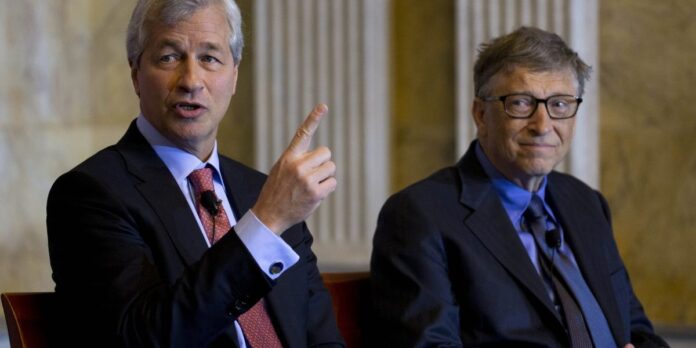Jamie Dimon and Bill Gates have shown support for Kamala Harris, but their contributions are not widely known. Gates, the cofounder of Microsoft, donated $50 million to a nonprofit backing Harris, as reported by multiple sources in the New York Times. On the other hand, Dimon, the CEO of JPMorgan Chase, has reportedly considered a role in Harris’s administration if she wins the presidential election.
Despite their support for Harris, Dimon and Gates have refrained from publicly criticizing former President Donald Trump as he vies for the White House again. Both have remained quiet in their critiques, even as Trump maintains a slight lead over Harris in the polls leading up to the election.
Dimon and Gates are among a group of high-profile executives, including most Fortune 100 CEOs, who have negative views of Trump but keep their opinions behind closed doors.
According to Yale School of Management professor Jeffrey Sonnenfeld, who is known as the “CEO whisperer” due to his relationships with American executives, Dimon and Gates are maintaining their silence to preserve their power and influence for future use.
Sonnenfeld’s theory diverges from former American Express CEO Ken Chenault’s belief that CEOs stay silent on Trump out of fear of retaliation, which was highlighted by comments Trump made about seeking revenge on his adversaries.
JPMorgan Chase’s managing director of communications, Joe Evangelisti, stated that they are not afraid of retaliation and choose to focus on important policy issues rather than engaging in political discussions.
Gates did not respond to Fortune‘s request for comment.
Sonnenfeld suggested that Dimon and Gates are not worried about retaliation from Trump because they are not afraid of him. This is likely why they are not concerned about their support for Harris becoming public knowledge.
CEOs like Dimon and Gates choosing to stay quiet about their election views is part of a larger narrative on the relationship between business leaders and politicians in the U.S. Many CEOs believe that Trump’s policies do not align with their business interests, especially in terms of global trade and tariffs.
Sonnenfeld mentioned Harley-Davidson’s decision to move production overseas in response to Trump’s tariffs, as an example of CEOs’ concerns about the impact of his policies.
Despite their negative views on Trump, executives are not eager to publicly criticize him unless there is a significant political crisis that requires their intervention.
“They don’t see that they’re elected public officials,” Sonnenfeld said. “They are stewards of other people’s money as CEOs and public corporations.”






